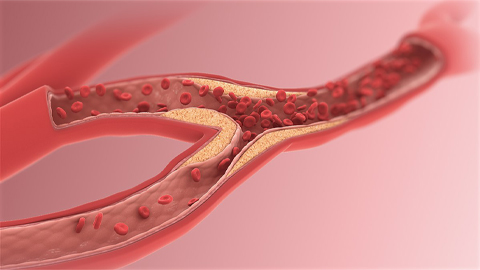From the journals: JLR
Liver gene silencing mitigates atherosclerosis. Pneumonia alters patient metabolic profiles. Liver enzyme links heart failure to kidney disease. Read about papers on these topics recently published in the Journal of Lipid Research.
Liver gene silencing mitigates atherosclerosis
High cholesterol levels are known to contribute to the onset of cardiovascular diseases such as atherosclerotic cardiovascular disease, or ASCVD. Statins, the most common cholesterol-lowering drugs to treat ASCVD, inhibit HMG-CoA reductase, or HMGCR, a key enzyme in the cholesterol biosynthesis pathway. In addition, the phosphorylation of an enzyme known as ubiquitin-specific peptidase 20, or USP20, increases the cholesterol biosynthesis rate by blocking HMGCR degradation.

In a recent study published in the Journal of Lipid Research, a group of researchers led by Yi Ding and Qiu–Bing Chen from Wuhan University silenced the Usp20 gene in the mouse liver using short interfering RNAs, or siRNAs, packaged in lipid nanoparticles, or LNPs. Using ligands that bind target cell receptors, LNPs can be delivered to specific cells, such as liver hepatocytes.
The researchers introduced LNP-packaged Usp20 siRNA to normal mice and observed reductions in USP20 and consequently, HMGCR, protein levels in the liver but not in other organs. Furthermore, when these mice ate a high-fat diet, they had lower body weights compared to untreated controls on the same diet. The authors also tested the effect of Usp20 siRNA LNP treatment on mice that lacked the low-density lipoprotein receptor, or LDLR. These mice are a widely accepted model for atherosclerosis, as LDLRs are needed to clear LDL, often known as “bad” cholesterol, from the blood. Among the mice that lacked LDLR, those treated with Usp20 siRNA LNPs had reduced aortic atherosclerotic plaques and lower levels of serum cholesterol and triglycerides.
This method of silencing Usp20 may offer a promising alternative for patients who have developed statin resistance — although the authors reported a slight elevation in serum aspartate aminotransferase, or AST, a marker for liver toxicity, which warrants further investigation.
Pneumonia alters patient metabolic profiles
Pneumonia is an infection that causes the inflammation of the lung air sacs. It can be acquired in the community, outside of a healthcare setting, or due to exposure to pathogens, such as SARS-CoV-2, the virus that causes COVID-19. Both community-acquired pneumonia, or CAP, and COVID-19 pneumonia can affect serum lipid levels. For example, serum lipids that form rafts in plasma membranes rise during infection to promote an immune response.
In a recent study published in the Journal of Lipid Research, Mireia Saballs of Quiron Salud Hospital, Sandra Parra of Sant Joan University Hospital and their colleagues in Spain used nuclear magnetic resonance, or NMR, spectroscopy to perform lipidomic and metabolomic analyses on the serum of patients with CAP and COVID-19 pneumonia. The researchers found significant differences in the lipidomic and metabolomic profiles of both cohorts relative to their healthy counterparts. Some of these differences correlated with disease severity and are more pronounced in patients with COVID-19 pneumonia than CAP.
The researchers also found that the lipidomic profiles of both groups of pneumonia patients mimicked atherogenic dyslipidemia, an abnormal blood lipid profile associated with high risk for cardiovascular diseases like atherosclerosis. The pneumonia patients also had elevated levels of glycoproteins, which indicated inflammation, and some branched–chain amino acids, which emphasized changes in energy metabolism. Altogether, these alterations can help identify new diagnostic biomarkers and therapeutic targets for pneumonia, regardless of how it was acquired.
Liver enzyme links heart failure to kidney disease
Patients with chronic kidney disease, or CKD, often experience cardiovascular complications, including acute decompensated heart failure, or ADHF, a life-threatening condition in which the heart can no longer pump blood effectively. Previous research suggested that a less active lecithin cholesterol acyltransferase, or LCAT, may increase the risk of cardiovascular mortality in CKD patients. LCAT is a liver enzyme that catalyzes the maturation of high-density lipoprotein, or HDL, which is eventually excreted via the liver.
In a recent study published in the Journal of Lipid Research, researchers at the Medical University of Graz in Austria, led by Julia T. Stadler, investigated disease progression and cardiovascular complications in 453 predialysis CKD patients in stages 2-4. There are five stages of CKD, which are defined by how well the kidney can filter blood, the final stage being kidney failure. The researchers used a commercial fluorescence-based assay to measure LCAT activity in the serum of CKD patients and found that LCAT activity does not correlate with CKD stages. However, they confirmed that low LCAT activity is associated with a higher risk for ADHF and mortality. This finding further cemented the promise of using LCAT as a pharmaceutical target to mitigate cardiovascular mortality in CKD.
Enjoy reading ASBMB Today?
Become a member to receive the print edition four times a year and the digital edition monthly.
Learn moreGet the latest from ASBMB Today
Enter your email address, and we’ll send you a weekly email with recent articles, interviews and more.
Latest in Science
Science highlights or most popular articles

From humble beginnings to unlocking lysosomal secrets
Monther Abu–Remaileh will receive the ASBMB’s 2026 Walter A. Shaw Young Investigator Award in Lipid Research at the ASBMB Annual Meeting, March 7-10 in Washington, D.C.

Chemistry meets biology to thwart parasites
Margaret Phillips will receive the Alice and C. C. Wang Award in Molecular Parasitology at the ASBMB Annual Meeting, March 7-10 in Washington, D.C.

ASBMB announces 2026 JBC/Tabor awardees
The seven awardees are first authors of outstanding papers published in 2025 in the Journal of Biological Chemistry.

Missing lipid shrinks heart and lowers exercise capacity
Researchers uncovered the essential role of PLAAT1 in maintaining heart cardiolipin, mitochondrial function and energy metabolism, linking this enzyme to exercise capacity and potential cardiovascular disease pathways.

Decoding how bacteria flip host’s molecular switches
Kim Orth will receive the Earl and Thressa Stadtman Distinguished Scientists Award at the ASBMB Annual Meeting, March 7–10, just outside of Washington, D.C.

Defining JNKs: Targets for drug discovery
Roger Davis will receive the Bert and Natalie Vallee Award in Biomedical Science at the ASBMB Annual Meeting, March 7–10, just outside of Washington, D.C.

